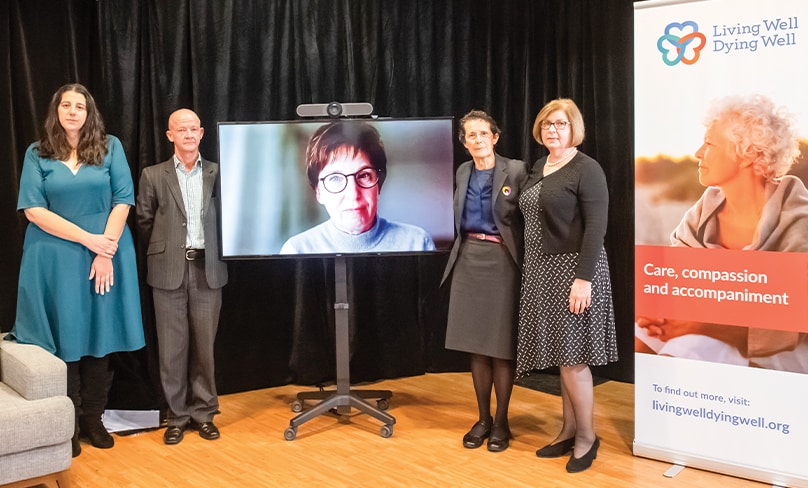
An innovative new program has been launched drawing upon the rich pastoral traditions of the church to help accompany the dying
People living with a terminal or life-limiting illness are being encouraged to reach out for compassion and accompaniment through a network of palliative care volunteers across parishes, health agencies and aged care.
Living Well Dying Well was launched by Archbishop Anthony Fisher OP last October.
Drawing on the rich tradition of pastoral care in the Catholic Church, it brings together Catholic Cemeteries and Crematoria, the Archdiocese’s CatholicCare social welfare agency, CatholicCare Broken Bay, Catholic Healthcare, the University of Notre Dame Australia and St Vincent’s Health Australia.
Patrick O’Reilly, General Manager, Pastoral Services at CatholicCare and the project lead told The Catholic Weekly that several groups of palliative care accompaniment volunteers have already been trained and that modules would be offered to parishes and agencies with a focus on providing connection, companionship and presence for seriously ill people and their families.
In addition, a website, livingwelldyingwell.org provides quality information and resources to help normalise conversations around death and dying as a natural part of the cycle of life.
“… the main supports in the dying process in the past were within the community, but today the focus is on medical care and it is being managed by just a few close friends and family.”
At a community forum held at the Good Shepherd Seminary during Palliative Care Week on 25 May, Mr O’Reilly was joined by Patricia Thomas, Grief Care Managing Consultant at Catholic Cemeteries and Crematoria, Associate Professor of Bioethics Megan Best from the Institute of Ethics and Society at the University of Notre Dame Australia and Associate Professor of Medicine at Sydney University Maria Cigolini who is also a senior palliative medicine doctor.
Dr Cigolini told the forum that modern medicine actually contributes to suffering when clinical practice focuses exclusively on physical cure and healing and ignores the fact that our experience of suffering encompasses physical and mental states, alongside social and intrinsic spiritual influences.
She also explained that palliative care specialists work best when they have good support from the wider community.
Earlier, Dr Best told the paper that the strength of the Living Well Dying Well project lay in its capacity to rebuild skills that have been lost due to a focus on a “much more medicalised model of dying”.
“Death used to be a familiar experience and the main supports in the dying process in the past were within the community, but today the focus is on medical care and it is being managed by just a few close friends and family,” she said.
“We need to rebuild the community strength in supporting the dying process, supporting both the people who are dying and their carers. We also don’t really see examples of how to die well; most people haven’t seen a corpse.

“A project like this provides a gradual re-education of the general public of what was once known to everybody – and that is how to walk alongside someone who’s dying.
“WE NEED TO REBUILD THE COMMUNITY strength in supporting the dying process, supporting both the people who are dying and their carers.”
“It’s a very unfamiliar process today and that makes it a fairly scary process. But by empowering people in the community to walk alongside those on this journey we would hope that we can gradually rebuild that skill set and normalise dying again.”
Dr Best said that any experience of loss precipitates the raising of existential questions and that without the spiritual resources to answer those questions, they become “very distressed”.
“I think what we’re seeing in a community desire for euthanasia is a way to deal with those questions, because I think our community as a whole has lost touch with the spiritual realm,” she said.
“Many people don’t even have the vocabulary to express the distress they’re feeling when they’re faced with a terminal diagnosis. And I think that what euthanasia gives people is a sense of control over what is essentially uncontrollable.
“There will be suffering and loss in our lives which is inevitable and the only thing we can really do is decide how we’re going to respond to that. Our response to spiritual struggles can be one of growth.
“My passion is to reclaim pastoral care, and ideally clinical pastoral education, as a theology and a pastoral practice within our [Christian] tradition in our society. I believe we all innately have a capacity for care, empathy, and compassion.”
“As we pull on our spiritual resources and receive pastoral care from others, we can have a final stage of human development in the time between a terminal diagnosis and death. I’ve seen it myself; people can grow in wonderful ways or someone can despair.”
Ms Thomas said she hoped the collaboration would help to not only normalise the dying process, but the reality of suffering and grief, including times when a person receives a serious diagnosis, experiences loss of independence, or grieves their own impending death or the loss of a loved one.
“Grief is a natural human experience which is also increasingly becoming medicalised and pathologised,” she told The Catholic Weekly.
“Ageing and dying are processes of change, developmentally, I would say, it’s also a growth stage. My passion is to reclaim pastoral care, and ideally clinical pastoral education, as a theology and a pastoral practice within our [Christian] tradition in our society. I believe we all innately have a capacity for care, empathy, and compassion.”
For information and shareable resources, or to register for the free volunteer training or compassionate accompaniment from a volunteer see livingwelldyingwell.org
Related Articles:
